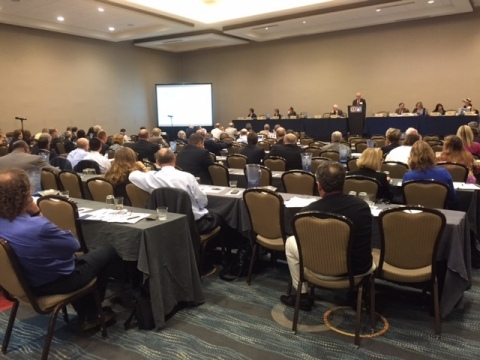TMCnet News
American Association of Clinical Endocrinologists (AACE) and American College of Endocrinology (ACE) Rally Public, Private Stakeholders to Advocate for Improved Regulatory Oversight, Enhanced Patient Access to Diabetes TechnologiesWASHINGTON --(Business Wire)-- Representatives from scientific and medical societies, patient advocacy groups, government entities, the insurance industry, the health products industry and more all agree that the time has come for regulatory improvements that will ensure the availability, safety and reliability of diabetes care technologies. 
Participants discuss the glucose monitoring issues surrounding the diabetes community in the breakout sessions at the AACE/ACE Consensus Conference on Glucose Monitoring in Washington D.C. on September 29-30, 2014. (Photo: Business Wire) This diverse cross-section of diabetes arena thought leaders gathered September 28 and 29 for the AACE/ACE Consensus Conference on Glucose Monitoring in which first steps were taken towards a concerted, collaborative effort necessary to address and overcome current barriers to optimal diabetes care. Specifically at issue is glucose monitoring, an essential treatment component for many of the nation's 29 million diabetes patients, either in the form of self-monitoring of blood glucose (SMBG), in which the patient performs frequent fingersticks to assess glucose values with a meter and makes corresponding treatment choices, or continuous glucose monitoring (CGM), which measures interstitial fluid glucose levels every one to five minutes through a sensor/transmitter/monitor system attached to the body. The use of such monitoring tools allows the patient and/or healthcare provider to make better-informed treatment choices, thus mitigating severe diabetes complications. Further, glucose monitoring has been proven to reduce hypoglycemia (low blood sugar)-related hospitalizations, thereby reducing healthcare costs. Some of the perceived barriers to optimal diabetes care discussed at the conference include insufficient FDA safeguards to assess performance and regulate quality of monitoring tools once they have been approved for market release and lack of adequate insurance coverage for necessary monitoring tools. Conference attendees debated in separate breakout sessions four questions that addressed issues such as reimbursement challenges, patient access, and safety and accuracy of devices. Key consensus points that will be presented by AACE representatives today at a congressional briefing include:
"Our hope is that recognition of the problems that exist will lead to viable solutions and much more favorable outcomes for the many patients with diabetes who rely on these technologies," said George Grunberger, M.D., Consensus Committee Chair. A complete multimedia kit of consensus conference coverage can be found at: http://bit.ly/GMCCmedia. About the American Association of Clinical Endocrinologists (AACE) The American Association of Clinical Endocrinologists (AACE) represents more than 6,500 endocrinologists in the United States and abroad. AACE is the largest association of clinical endocrinologists in the world. The majority of AACE members are certified in endocrinology, diabetes and metabolism and concentrate on the treatment of patients with endocrine and metabolic disorders including diabetes, thyroid disorders, osteoporosis, growth hormone deficiency, cholesterol disorders, hypertension and obesity. Visit our website at www.aace.com. About the American College of Endocrinology (ACE) The American College of Endocrinology (ACE) is the educational and scientific arm of the American Association of Clinical Endocrinologists (AACE). ACE is the leader in advancing the care and prevention of endocrine and metabolic disorders by providing professional education and reliable public health information; recognizing excellence in education, research and service; promoting clinical research and defining the future of clinical endocrinology. For more information, please visit www.aace.com/college.
Photos/Multimedia Gallery Available: http://www.businesswire.com/multimedia/home/20140930006456/en/ |

